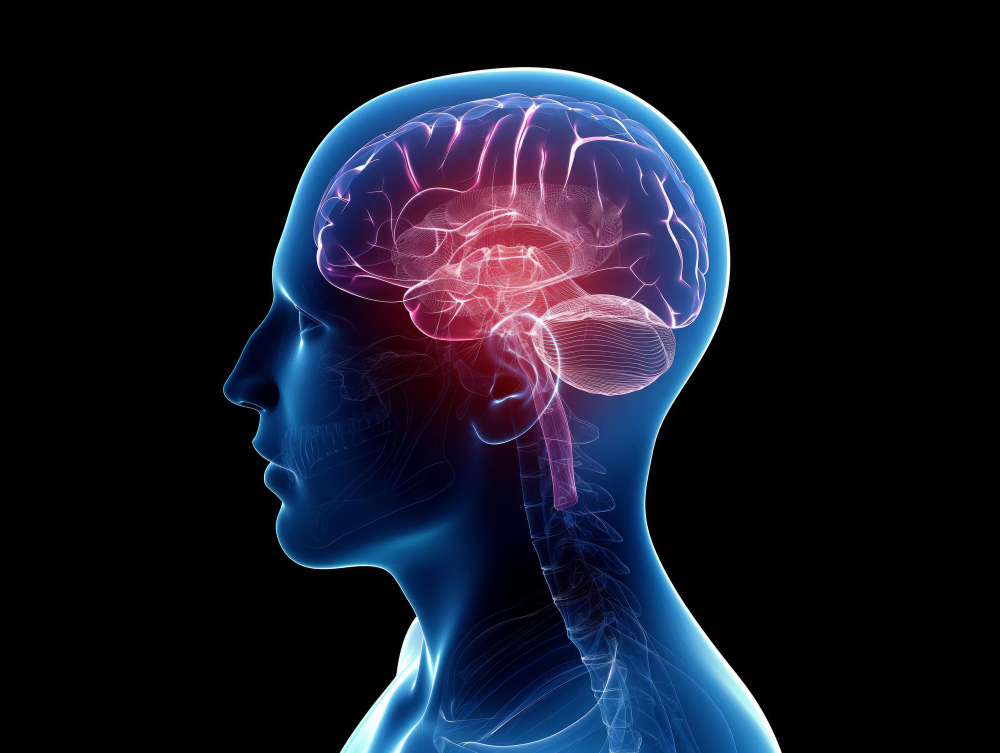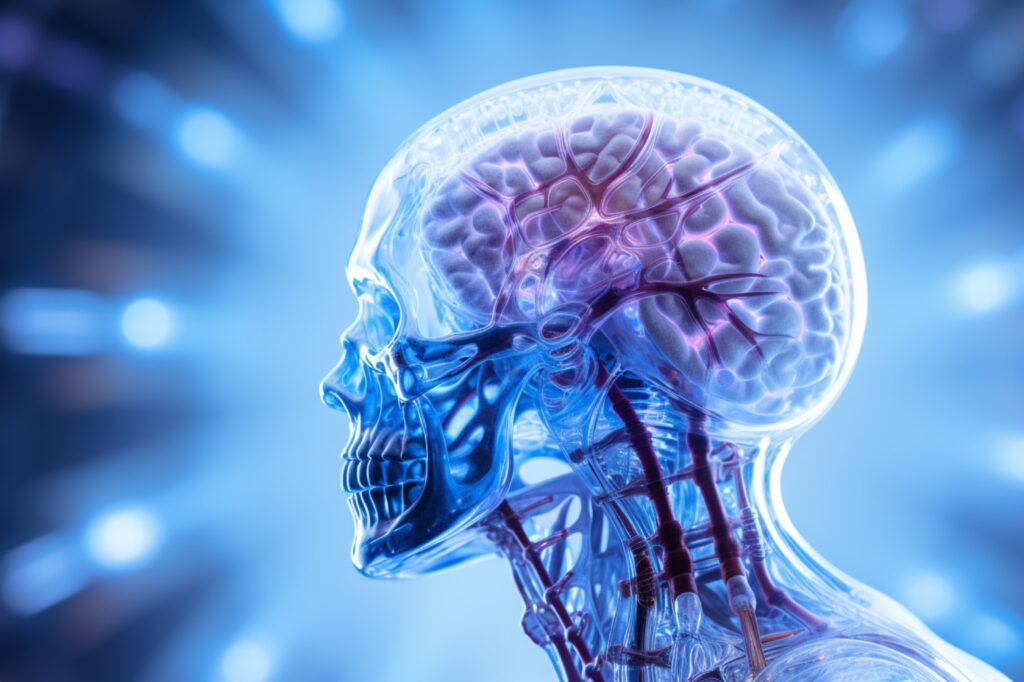Understanding the Vagus Nerve’s Influence on Anxiety

Mark Sue, an accomplished CFO and resident of Palo Alto,…
The vagus nerve might not be a household name, but its role in our bodies is crucial, particularly when managing anxiety. As a mother witnessing the struggles my son faces with anxiety, I’ve delved deeply into understanding this nerve, hoping to find ways to support him.
The vagus nerve, or the tenth cranial nerve, is aptly named after the Latin word for “wanderer,” reflecting its extensive journey through the body. It begins at the base of the skull, branching through the neck and down into the abdomen, making contact with an array of organs, including the heart and digestive tract. It is instrumental in regulating involuntary body processes like heart rate and digestion.
Balancing the Nervous System

This nerve is a critical player in the body’s parasympathetic system—often called the “rest and digest” system—which serves as a counterbalance to the sympathetic nervous system, responsible for the “fight or flight” response. In the face of stress, the sympathetic system ramps up, flooding our bodies with hormones that prepare us for action. However, when the stressor subsides, the vagus nerve helps to usher in a state of calm, allowing our body to relax and recuperate.
The Vagus Nerve and Anxiety
The interplay between the vagus nerve and anxiety becomes particularly apparent when considering how stress impacts our body’s equilibrium. In stressful situations, if the sympathetic response lingers without the calming influence of the parasympathetic system, a cascade of hormonal reactions ensues. This can lead to an overproduction of hormones like cortisol and adrenaline, which, while useful in short bursts, can be detrimental when levels remain high, potentially leading to a weakened immune response and an increased risk for depression.
The Impact of Chronic Stress

Chronic stress also drives up the levels of glutamate, an excitatory neurotransmitter. An excess can contribute to anxiety, depression, and migraines. Furthermore, high cortisol levels have been linked to reduced hippocampal volume, impairing the formation of new memories. Think of how your body is so stressed out sometimes.
Symptoms of a Dysregulated Vagus Nerve
The symptoms of a dysregulated vagus nerve can be diverse and sometimes severe, including dizziness, digestive issues, arrhythmias, and difficulty breathing. When this nerve cannot effectively signal relaxation, the body remains in a heightened state of alert, making individuals prone to impulsive reactions and pervasive anxiety. For my son, he is often stuck in this “fight, flight or freeze” response.
Vagal Tone and Maternal Influence
Interestingly, research from the University of Miami suggests that the ‘vagal tone’—the level of activity of the vagus nerve—is transmitted from mother to child. Mothers experiencing anxiety or stress during pregnancy may have reduced vagal activity, which can, in turn, affect their children, resulting in lower levels of neurotransmitters like dopamine and serotonin, both crucial for mood regulation .
Enhancing Vagal Tone
So, what can we do to nurture the health of our vagus nerve? Enhancing one’s vagal tone can significantly impact our emotional well-being. Techniques include:
Exposure to Cold
A brief cold shower or applying a cold compress to the face can stimulate the vagus nerve, helping to diminish the sympathetic “fight or flight” response.
Diaphragmatic Breathing
Deep, slow breathing encourages the vagus nerve to signal a need for calm to the brain, thus promoting relaxation.
Mindfulness and Movement
Mindfulness practices, yoga, and tai-chi have all been shown to enhance vagal tone. They can increase the release of GABA, a neurotransmitter that fosters a sense of tranquility, and regulate heart rate, further stimulating vagal activity.
For families like mine, where anxiety is not just a concept but a daily challenge, understanding the vagus nerve’s role offers a ray of hope. By incorporating simple techniques to support this critical nerve’s function, we can find solace and stability, turning what may seem like an elusive calm into an attainable state of being. For my son (he uses the Apollo Neuro) and for others dealing with anxiety, nurturing the vagus nerve may be a vital part of the journey toward healing and balance.
Here’s our take on the top vagus nerve stimulators:
Neuvana Xen
Pros: Portable with high-performance earbuds, wireless Bluetooth connectivity, and customizable through an app.
Cons: High price.
Key Features: The device is CE certified, designed for on-the-go use with a compact size, and focuses on stress management using non-invasive stimulation. It’s well-received by users and professionals for its effectiveness in harmonizing the autonomic nervous system.
Pulsetto
Pros: Quick relaxation, lowers stress and anxiety, improves sleep, and helpful for ADHD symptoms.
Cons: May not suit traditional meditation enthusiasts.
Key Features: Affordable, enhances heart rate variability, includes a 1-month trial of the premium app with guided meditations, and offers a money-back guarantee. It’s user-friendly and provides fast results.
Apollo Neuro
Pros: Seven mood-control settings, versatile wearability, aids in stress relief, energy boost, focus, and physical recovery.
Cons: Vibrations may not be relaxing for all users.
Key Features: A neuro-wearable device offering personalized experiences through an app, with mood-controlling “Vibes” for various needs, enhancing sleep quality and aiding in recovery.
Sensate
Pros: Reduces anxiety, improves sleep, customizable sessions, progress tracking.
Cons: Requires a smartphone app for full functionality.
Key Features: Combines sound and vibration therapy for vagal stimulation, scientifically validated, and designed for personal health management through a user-friendly app.
TouchPoints
Pros: Uses gentle vibrations for stress reduction, focus enhancement, and sleep improvement.
Cons: Not suitable for everyone; consultation with a healthcare professional is recommended.
Key Features: Wearable devices that have shown scientific efficacy in reducing stress and anxiety, emphasizing ease of use and health benefits.
Each device offers a unique approach to vagus nerve stimulation, ranging from portable earbuds and wearable bands to handheld units, catering to various preferences and requirements for stress management, relaxation, and overall well-being enhancement.
Conclusion
Understanding and nurturing the vagus nerve can be a transformative approach to managing anxiety and improving overall well-being. For those like my son, who struggle with anxiety, these insights and tools provide practical ways to achieve a calmer, more balanced life. As we continue to explore and implement these techniques, we can look forward to a future with less stress and more tranquility.
Mark Sue, an accomplished CFO and resident of Palo Alto, brings a unique perspective to the wellness and community-building space. With extensive experience in tech startups and a personal commitment to addressing the loneliness pandemic, Mark now serves as the CFO of Breathe, where he champions the mission of enriching lives through meaningful connections. Mark is a dedicated family man, devoted to his wife, three children, and their shared love for active pursuits like pickleball and Padel.
